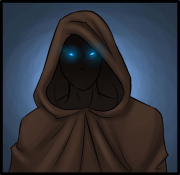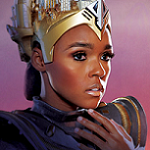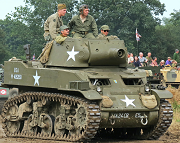|
A friend of mind keeps linking me to threads on here, so I thought I'd post my $0.02 about it. It's an old design saw that, "Every game is someone's FIRST game." There are a lot of self-published RPGs out there that start by assuming people have already played D&D. Much of the modern OSR movement is just, "Let's take D&D and add more rules to it!", which carrying the torch from the Alduin/Judge's Guild era. "You've played D&D, now play us!" White Wolf had a big breakout hit in the 1990s with their VAMPIRE game. It's filled with contemporary references to the goth culture that was popular at the time. "Hey, do you like Anne Rice? Now you can pretend to be it!" While the books look dated now, back then it was sales gold. Vampire became a cultural phenomenon, and there were many people who played VAMPIRE and nothing else. The writers of VAMPIRE took a popular subject (goth culture), recognized the under-served market, and then wrote a game the market could enjoy. The VAMPIRE game were also "authentic" - vampires worked exactly the same way they worked in your Anne Rice and Laurel Hamilton books. The 2000s opened with the rise of OGL/SRD/d20, and a lot of it went for nostalgia gaming. The phrase "Third edition rules, first edition feel!" meant absolutely nothing to someone who'd never played D&D before, let alone a tabletop game. The market imploded, not just because there was too much of it, but also because it wasn't luring in new customers. There's only so many "30 sorcerer variant" books you can buy. A large section of RPG tabletop today takes a popular subject (nostalgia), recognizes only the over-saturated market, and then writes a game for that market. That's a difficult way to get in, and by definition, a nostalgia market is a shrinking one. The nostalgia games are, however, "authentic" - the orcs, slimes, mind flayers, and beholders work exactly the same way they did in your games when you were a kid. Today, if a tabletop game wants to appeal to people, it should be asking, "Who are the customers of the future?" The short answer is, a lot of people play video games. It's a surer bet to say that that someone has played DOTA, LOL, or WoW than to say they've played D&D, FATE, or PbtA. As video games became more sophisticated, they competed with this idea of imagination. Fire up Witcher 3 and you're treated to stunning vistas, beautiful models, and clever voice acting. A modern video game is very immersive and evocative, without having to "imagine" what a house looks like. These video games have some strange ideas, but they're very popular. For example, what do Diablo, Monster Hunter , Dark Souls all have in common? You can reload a crossbow by shaking it. Modern tabletop designers should consider how to reach out to new, under-served markets. There's millions of computer-game players out there. What would make a computer-game player want to play a tabletop game? What does a computer-game player think is "authentic", which would make them enjoy the game more? What experiences do computer games offer, that can be brought to tabletop? What experiences can tabletop do BETTER? What does tabletop offer that computers don't?
|
|
|
|

|
| # ? Apr 16, 2024 16:11 |
|
The major problem with computer games is they can simulate a lot more stuff that a human would take hours to process. Like nation-building games like the ones Paradox uses are cool, but gently caress you if you think I'll sit there while a million other people's lives have to be rolled for the next turn to begin. Video games are just a different kind of beast, especially since they've become more like interactive movies than an actual game.
|
|
|
|
Oh christ, is it 1988 again already?
|
|
|
|
Hitlers Gay Secret posted:The major problem with computer games is they can simulate a lot more stuff that a human would take hours to process. Different beasts, sure, but they're at the same zoo; if we want people to care about our weird dice animals when Halo is the next cage over, we need to figure out what's special about it, what to focus on. I do think this is a big part of the recent rise in games where the rules all revolve around story development, rather than traditional 'gameplay'. If we want to play a game, we can usually get a better experience out of a computer. If we want to see a story happen, the best tools for that are still arguably tabletop RPGs. Jury's out as to which ones.
|
|
|
|
RiotGearEpsilon posted:If we want to see a story happen, the best tools for that are still arguably tabletop RPGs. Tell that to all the idiots who play Bioware games religiously.
|
|
|
|
I chose my words carefully, but apparently not successfully. What I mean is, with a Bioware game, you're watching a story. It might be a good story, you might like it, it might be a garbage story that you hate, whatever. The point is, the story has already happened. Some people wrote it, you're going through it. With a tabletop RPG, the story is coming together and being created as you play. This isn't equally true for all RPGs, you're probably going to get more unexpected improv out of Prime Time Adventures or the like than you will from a bog-standard DnD dungeon crawl, but this is something that I think tabletop RPGs at their best are still better at than computer games at their best. I mean, the computer game that springs to mind when I say 'see a story being created before your eyes' is Dwarf Fortress, and that's not nothing, but it pretty consistently produces farce.
|
|
|
Rafferty posted:These video games have some strange ideas, but they're very popular. For example, what do Diablo, Monster Hunter , Dark Souls all have in common? You can reload a crossbow by shaking it. Could you explain this "shake to reload" analogy? It's not making any sense to me. In Diablo you don't have to reload anything, you just shoot it. I don't even think D3 makes you worry about ammo management anymore. Dark Souls I've barely played and haven't used ranged weapons in so I can't comment. Monster Hunter has a long loading animation for your bowguns as if simulating actual reloading time. It might even be longer if you're using a Heavy Bowgun, I think. Plus the game has TONS of ammo management - you're constantly reloading different shots and even spending extra time crafting more ammo in the field, especially if you're a status gunner. If you're referring to that these games do not attempt to complicate the process/emulate the entire process of firing and reloading a crossbow, I haven't played any tabletop games that go that realistic. It's all been "shoot at the kobolds, maybe manage your ammo". Occasionally you have to spend an action reloading, but it's rather low-key. So what's this shaking analogy?
|
|
|
|
|
The market of the future is hipsters. Look at all these stupid mainstream babies playing their video games! I claim my identity by playing this steampunk beard grooming simulator.
|
|
|
|
John Quixote posted:If you're referring to that these games do not attempt to complicate the process/emulate the entire process of firing and reloading a crossbow, I haven't played any tabletop games that go that realistic. It's all been "shoot at the kobolds, maybe manage your ammo". Occasionally you have to spend an action reloading, but it's rather low-key. So what's this shaking analogy? Apparently, there's been a flap in the D&D5 forums over an errata that felt obligated to mention, specifically and unambiguously, it takes two hands to reload a crossbow. No crossbow in the history of anything ever has needed fewer than two hands to reload. Heck, most crossbows need two hands to fire them. (The Chinese repeating-crossbow uses one hand to aim and one hand to work the gravity-feed.) But video games make reloading a crossbow a one-handed affair. Is this good or bad? Well, it's certainly an observation in modern trends in gaming. The shaking analog refers to how video games often have some weird kind of "twirl" or "shake" animation that instantly reloads the gun. In Kane & Lynch 2, a naked man holding a hostage can completely reload a pistol just by twirling it around his finger! Some games don't even have reloading animations -- the Bloodborne game just has your gun reload as if by magic. As for managing ammo, I can't speak about what games you've been playing. D&D3/PF make managing ammo a very specific point, especially because magic ammo is an expensive resource. D&D5 certainly TELLS players to track ammo, whether they do or not could be a "house rule". World of Darkness, Shadowrun, and other games with guns that have bullets in them make you count every individual bullet.
|
|
|
|
Rafferty posted:In Kane & Lynch 2, a naked man holding a hostage can completely reload a pistol just by twirling it around his finger! Hostages are well known for their deep reserves of ammunition and limitless desire to give it to their captors
|
|
|
|
Rafferty posted:Apparently, there's been a flap in the D&D5 forums over an errata that felt obligated to mention, specifically and unambiguously, it takes two hands* to reload a crossbow. It's hardly limited to video games. Ever watched a western? A police procedural? A war movie? Did Legolas ever take a scene to painstakingly count out the arrows in his quiver? In the book? How many scenes are "we're low on ammo" compared to "we have exactly 3 rounds left?" When the exact number of ammunition is given, how often is it exactly enough? Short by exactly 1? In the big leagues of fiction, nobody devotes brain power to tracking ammunition. Occasionally characters will run out of ammo as fits the story being told. *As a footnote, the errata requires a "free hand" to reload a crossbow. This is a subtle difference, as anyone who's ever failed the impossible task of holding two items in the same hand can tell you. Why, just think about the last time your buddy fetched beers for everyone in your group. They had to make multiple trips because they could only carry 2 beers at once. One per hand. Like Gygax intended.
|
|
|
|
It can be important for survival sims, though, which is where D&D came from. If I ever make the tank game I keep dreaming about it'll probably have shell rationing because you might plausibly run out of the ready rack or APDS or whatever.
|
|
|
|
Thanks to playing Civilization 5 and researching the early tech tree, I know that Alfred Hitchcock said "What is drama but life with the dull bits cut out" Managing ammunition in inventory is the very definition of a "dull bit", but can be interesting if you are making meaningful decisions based off of it. There's a face to face interaction that video games don't capture as well. In a tabletop game, when someone is making a move you are either watching them or watching the move on the board or table (that is, what they're looking at). You're able to glean clues of what the player is thinking or planning in context better than playing a digital version online with strangers. In a local couch-multiplayer video game, you're both watching the playfield (screen) together or maybe a subset of it. That's still a shared experience, and you're probably communicating verbally. When you and a friend are in different locations connected to the same Battlefield 4 server, it feels pretty impersonal (though it helps if you're connected on voice chat, at least).
|
|
|
|
That's the reason I mention the survival sim thing. How many bullets in the gun is important as a meaningful decision if you're uncertain how long it is until you'll be able to scavenge more, and are weighing up the risk of killing the monster with your fire axe and maybe getting mauled yourself or just shooting it, for a random example.
|
|
|
|
Rafferty posted:What would make a computer-game player want to play a tabletop game? face-to-face human interaction this question makes no sense what face-to-face human interaction Literally you are barking up the wrong tree here entirely buddy. I also don't get what the issue you have is, tabletop games are incredibly popular and make hundreds of millions of dollars per year, look at craps, roulette, and card games. and someone said "Hipsters" already which is basically true, look at the success of that exploding kittens game, and the continued success of Cards Against Humanity. Anything that is a face-to-face parlor game is going to be more successful then any manner of niche RPG product.
|
|
|
|
Laphroaig posted:face-to-face human interaction People don't play Magic (for example) for the face to face human interaction, at least not intrinsically. It helps, but it's not the focus. The focus there is the game itself. What he's asking about is what can be borrowed from computer games to improve the framework of RPG and make them better as games, instead of relying on 'tell stories with your friends!'.
|
|
|
|
spectralent posted:That's the reason I mention the survival sim thing. How many bullets in the gun is important as a meaningful decision if you're uncertain how long it is until you'll be able to scavenge more, and are weighing up the risk of killing the monster with your fire axe and maybe getting mauled yourself or just shooting it, for a random example. You can still abstract it and make the specifics more fun, Having something like the gamma world ammo system where you have an ammo item and if you fire your weapon only a couple times you are conserving ammo and don't lose any but any more than that and you lose an ammo at the end of the encounter. For a survival game i would make it more strict and say that if you fire a weapon at all you lose an ammo it's not like you would track every calorie of food or gallon of water they collect
|
|
|
|
Elfgames posted:For a survival game i would make it more strict and say that if you fire a weapon at all you lose an ammo it's not like you would track every calorie of food or gallon of water they collect I've been thinking about Mad Max, and Max's shotgun. He often has some (unreliable) ammo, but the gun only actually fires when it's the coolest possible thing that could happen. You could probably sum this up in rules as "Once per adventure, fire the shotgun. Once you've used it, you are out of usable ammo. Regardless of the state of its ammo, the shotgun gives a bonus to intimidate people". If you wanted cruncier, "You have some unreliable ammunition. When you fire the shotgun, <small chance> it misfires, <large chance> it fires correctly. After you successfully fire the shotgun, roll <small chance> or you're out of usable ammo. Regardless of the state of its ammo, the shotgun gives a bonus to intimidate people." In either case, you could start without ammo and make "find some ammo" a thing that can/should happen. Just having the gun is a pretty big deal for Max after the first movie. Obviuously this doesn't fit in with the idea of a tabletop <whatever> simulator, but eh.
|
|
|
|
Elfgames posted:You can still abstract it and make the specifics more fun, Having something like the gamma world ammo system where you have an ammo item and if you fire your weapon only a couple times you are conserving ammo and don't lose any but any more than that and you lose an ammo at the end of the encounter. You could do that, but at that point you're debating how much granularity you want out of your ammo tracking system, rather than whether it's legit to track ammo beyond binary states at all, which is my overall point that in games where scarcity and risk-reward are core decision metrics, having an ammo tracking mechanism can be good game design (and some games do track trail rations and stuff). I agree that 90% of games are doing it because D&D did it though.
|
|
|
|

|
| # ? Apr 16, 2024 16:11 |
|
Transient People posted:People don't play Magic (for example) for the face to face human interaction, at least not intrinsically. It helps, but it's not the focus. The focus there is the game itself. What he's asking about is what can be borrowed from computer games to improve the framework of RPG and make them better as games, instead of relying on 'tell stories with your friends!'. Ok, then the answer is nothing, computer games can do anything an RPG can do except have face to face human interaction. RPG attempts to emulate what a computer game can easily do are going to fail, and failed historically whenever it is attempted. "Tell stories with your friends" is the entire point behind the utterly massive time commitment that tabletop RPGs require. Does everyone forget the 90s, with a trillion billion licensed RPG products based on every successful video game, and how they were basically all terrible? There exist quick party games (already popular). There exist boardgames (already popular). Trying to make RPGs better by making them more like computer games via taking mechanics or attempting to emulate 'feel' has been tried before, and is either impossible because the complexity and book-keeping makes it terrible, or results in a lovely licensed product based off the chassis of an existing rule system (see, the D20 products, before that GURPS or Tri-Stat or whatever).
|
|
|

















